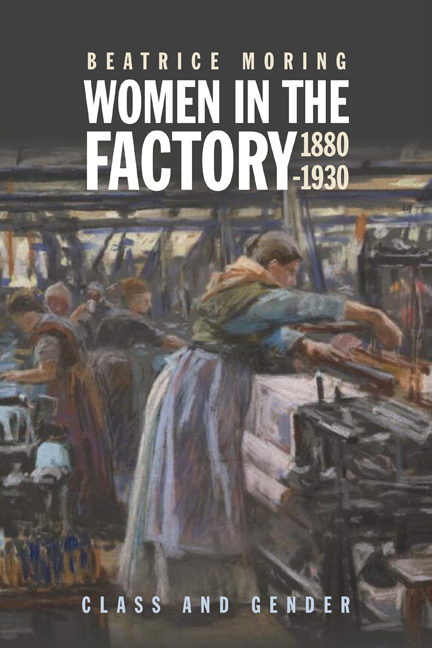Book contents
- Frontmatter
- Contents
- List of Illustrations
- Introduction – Why Women in the Factory?
- 1 Gender And Class – Male Unions, Political Movements and the Female Vote
- 2 Women in Industry: Work, Sectors, Age and Marital Status
- 3 Women, Earnings and the Household – Why the Factory?
- 4 Accidents, Compensation, Laws and Inspection
- 5 Middle Class Girls, Education and Entry into the Civil Service
- 6 The Female Factory Inspectors – How, Why and Who
- 7 Factory Inspection Activity
- 8 Class, Gender and Communication
- Conclusion
- Appendix 1 The Right for Women to Vote in National Elections
- Appendix 2 Women in the Workforce
- Appendix 3 Women, Work, Earnings and Family
- Appendix 4 Accidents, Workplace Acts and Regulations
- Appendix 5 Education
- Appendix 6 Female Inspectors
- Appendix 7 Inspectors, Activity
- Appendix 8 The Female Inspectors and Society
- Bibliography
- Index
6 - The Female Factory Inspectors – How, Why and Who
Published online by Cambridge University Press: 09 May 2024
- Frontmatter
- Contents
- List of Illustrations
- Introduction – Why Women in the Factory?
- 1 Gender And Class – Male Unions, Political Movements and the Female Vote
- 2 Women in Industry: Work, Sectors, Age and Marital Status
- 3 Women, Earnings and the Household – Why the Factory?
- 4 Accidents, Compensation, Laws and Inspection
- 5 Middle Class Girls, Education and Entry into the Civil Service
- 6 The Female Factory Inspectors – How, Why and Who
- 7 Factory Inspection Activity
- 8 Class, Gender and Communication
- Conclusion
- Appendix 1 The Right for Women to Vote in National Elections
- Appendix 2 Women in the Workforce
- Appendix 3 Women, Work, Earnings and Family
- Appendix 4 Accidents, Workplace Acts and Regulations
- Appendix 5 Education
- Appendix 6 Female Inspectors
- Appendix 7 Inspectors, Activity
- Appendix 8 The Female Inspectors and Society
- Bibliography
- Index
Summary
I doubt very much whether the office of factory inspector is suitable for women.
(UK Chief Inspector of Factories, 1879)In face of considerable opposition and claims that the economy was going to be ruined, Britain introduced the first workplace regulations in 1833 and 1844, followed by France in 1841. It soon became apparent, however, that legislation without control had little impact on the work of children and a system of factory inspection was set up in these countries within a year of the new legislation. The early inspection system left much to be desired: initially, four factory inspectors were deemed sufficient for the whole of Britain. Furthermore, some of the early inspectors were not particularly active, some had tendencies to bond with the factory owners because of recruitment, salaries or ideology.
In 1874, a state-funded system with 15 inspectors overseeing a regional inspectorate was introduced in France and by 1891 no less than 73 departmental inspectors had been engaged. The department of Seine saw the engagement of women in the inspections of schools and welfare institutions already in 1878 and from 1892 the state also appointed women for inspecting factories employing women and children.
Safety and hygiene problems were also raised outside Britain and France during the second half of the nineteenth century by doctors, philanthropists and factory workers. Regulations about accident funds financed not only by workers but also factory owners raised more awareness in relation to dangerous machinery. The state and local governments, which had little desire to take on the economic responsibility for individuals loosing health and limbs in the factories, saw the benefits of an inspection system eliminating obvious dangers. As a result, many countries in Europe and members of the British Commonwealth introduced workplace legislation and inspection by the 1880s.
Feminism, social reform and the discussion about female factory inspectors
The late nineteenth century was the time of the rising specialist. Traditional notions were looked down upon; the urban landscape was transformed not only by the tramway and streetlights but also by piped water, the water closet and the creation of milk and meat inspection offices. Old superstition was to be replaced by new rationality, embodied in the knowledge of technology, chemistry and medicine.
- Type
- Chapter
- Information
- Women in the Factory, 1880-1930Class and Gender, pp. 140 - 180Publisher: Boydell & BrewerPrint publication year: 2024

